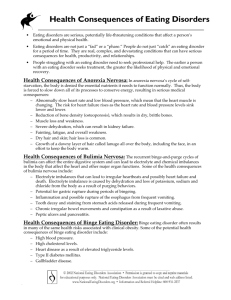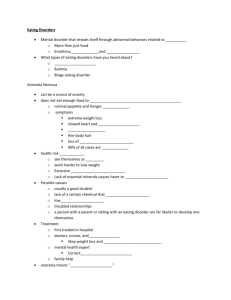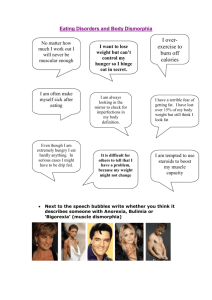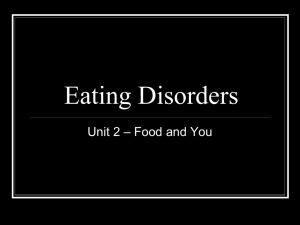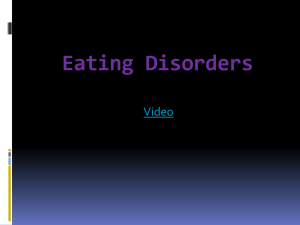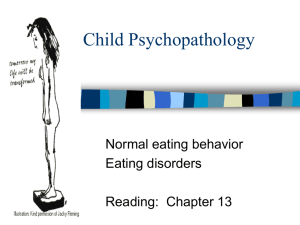What is an Eating Disorder?
advertisement
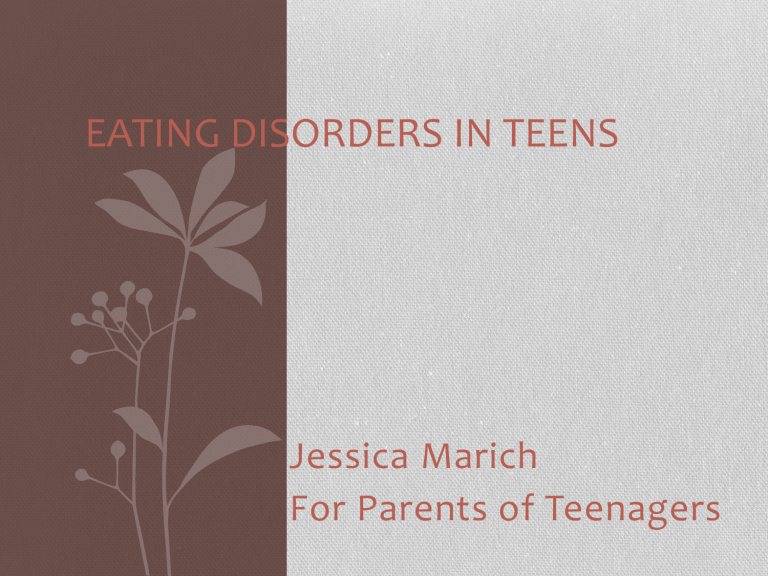
EATING DISORDERS IN TEENS Jessica Marich For Parents of Teenagers What is an eating disorder? • Abnormal eating habits • Include thoughts of weight control • Response of stress • Can be life threatening Who is most likely to have an eating disorder? • Young teens • Mostly girls • But boys develop eating disorders as well Eating disorders in boys • Mostly linked to sports • Less likely to seek help because they are “women disease” • Bulimic boys are more likely to exercise than to purge Eating disorders in girls • Girls are influenced easily • When girls feel they are out of control of their lives they turn to weight control • Can be caused by child abuse • Manage stress by restricting diet Types of eating disorders Binge Eating Bulimia Nervosa Anorexia Nervosa Anorexia Nervosa Bulimia Nervosa • Binge Eating Disorder Anorexia Statistics • Boys Girls 10-15% with anorexia 81% of ten year olds are afraid to gain weight Less likely to see help 20% of gay men are anorexic 69% 5th -12th graders body image is influenced by magazines 20% at risk of death Bulimia Statistics Boys Girls 10-15% have bulimia Less likely to seek help 14% gay men are bulimic 50% anorexic girls become bulimic 18 times more likely from diet changes Binge Eating Statistics Boys Girls 40% of people with binge eating disorder are boys 60% of people with binge eating disorder are girls. Most common in girls Signs of Anorexia Nervosa • Thin • Pale • Obsessive over weight control • Depressed • Wont eat in front of others Signs of Bulimia Nervosa • Afraid to gain weight • Disappear to bathroom after every meal • Can have a normal body weight • Tooth decay • Use laxatives or diet pills Signs of Binge Eating • Weight gain • Eat excessive amounts of foods • Eat in secret • Never feel satisfied • Lie Causes of eating disorders in teens • Society/media • Low self-esteem • Certain sports Consequences of eating disorders • Dizziness • Extreme fatigue • Weakness • Loss of sleep • Loss of muscle and bone • Depression • Seizures • Oral problems How to protect your teen from an eating disorder. • Be a role model • Promote healthy eating habits • Explain how the media works • Don’t use food as a reward or as a consequence • Educate them Seeking treatment • Talk to your teen • Schedule a check up with their doctor • If diagnosed: seek therapy, nutritionist, or medication Awareness • References • Mayo Clinic Staff (2012 May 22) Teen eating disorders: Tips to protect your teen. Retrieved from www.mayoclinic.org/healthyliving/tween-and-teen-health/in-depth/teen-eating-disorders • New, Michelle. (2011 January) Eating Disorders. Retrieved from: www.kidshealth.org/teen/food_fitness/poblems/eat_disorder .html • Bing Eating Disorder. Retrieved from: www.nationaleatingdisorders.org/binge-eating-disorder • (2014) Eating Disorder statistics. Retrieved from: www.anad.org/getinformation/about-eatingdisorders/eatingdisordersstatistics/ • (2012) What is an Eating Disorder? Retrieved from: www.northwesteren.edu/counselng/aboutus/services/eating-concerns/what-is-an-eating-disorder.html • Farrar, Tabitha (2014) Men With eating Disorders. Retrieved from: www.mirror-mirror.org/men.htm • Thompson, Colleen Women and Eating Disorders. Retrieved from: www.mirror-mirror.org/women.htm
